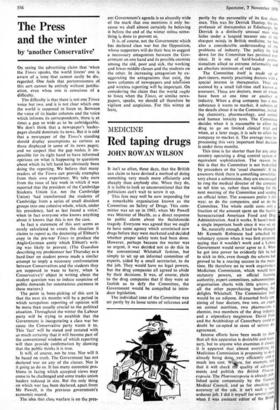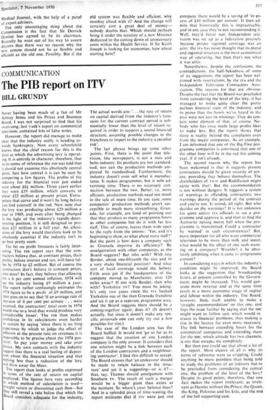MEDICINE
Red taping drugs
JOHN ROWAN WILSON
It isn't so often, these days, that the British can claim to have devised a method of doing something very much more efficiently and cheaply than anybody else. When they do, it is liable to look so unconventional that the politicians can't wait to screw it up.
This fate may well be now impending for a remarkable organisation known as the Committee on Safety of Drugs. This com- mittee was set up in 1963, when Mr Powell was Minister of Health, as a direct response to public alarm about the thalidomide tragedy. Everyone was agreed that we ought to have some agency which scrutinised new drugs before they were marketed and decided whether proper safety tests had been done. However, perhaps because the matter was so urgent, it was decided not to do this in the conventional Whitehall fashion, but simply to set up an informal committee of experts, aided by a small secretariat, to do the job. They would have no legal powers, but the drug companies all agreed to abide by their decisions. It was, of course, plain to the drug companies that if they were so foolish as to defy the Committee, the Government would be compelled to intro- duce legislation.
The individual tone of the Committee was set partly by its loose terms of reference and
partly by the personality of its first chair- man. This was Sir Derrick Dunlop, the en- professor of therapeutics at Edinburgh. Sir Derrick is a distinctly unusual man who hides under a languid manner one of the sharpest minds in British medicine; he has also a considerable understanding of the problems of industry. The policy he laid down for the Committee has persisted ever since. It is one of hard-headed profes- sionalism allied to extreme informality and an absolute minimum of red tape.
The Committee itself is made up of part-timers, mostly practising doctors with a special interest in therapeutics. They are assisted by a small full-time staff known as assessors. These are doctors, most of whom have been at one time or another in industry. When a drug company has a new substance it wants to market, it submits all the details about it to the Committee, includ- ing chemistry, pharmacology, and animal and human toxicity tests. The Committee decides when it is reasonable to allow the drug to go on limited clinical trial and when, at a later stage, it is safe to allow the company to market it. The average time for processing this very important final decision is under three months: This time is far shorter than for any other country operating a drug control system of equivalent sophistication. The reason for this is that the Committee is not bedevilled by procedure or the 'usual channels'. If the assessors think there is something unsatisfac. tory about a submission, they are encouraged to ring the medical director of the company to tell him so, rather than waiting for the next meeting of the Committee and sending an official letter. The assessors prefer it this way; so do the companies, and so do the Committee. The whole outfit costs only a fraction of the amount spent on the heavily bureaucratised American Food and Drug Administration. And it works. It hasn't made a single important boob since it was set up.
So, naturally enough, it had to be changed.
Mr Kenneth Robinson had attacked the voluntary system when it was first proposed, saying that it wouldn't work and a Labour Government would never agree to it. When he got into power he evidently felt he had to stick to this, even though the scheme had proved to be a roaring success in the mean- time. He therefore set to work organising a Medicines Commission, which would have statutory powers, an official licensing authority, expert committees, subcommittees, organisation charts with little arrows, and all the other paperchasing humbug that delights Whitehall. The Commission itself would be an adipose, ill-assorted body con- sisting of four doctors, two vets, an expert on animal nutrition, two pharmacists, 3 chemist, two members of the drug industry, and a stipendiary magistrate. David Frost and the Archbishop of Canterbury could no doubt be co-opted in cases of serious dis. agreement. Intense efforts have been made to show that all this apparatus is desirable and nec& sary, but to anyone who examines it closely, it is apparent that almost everything the Medicines Commission is proposing to do iS already being dons, very efficiently and at
much less cost. re,
sifrio for example, told that it will check" quality of advertise. ments and publish the British Pharma- copoeia. The Pharmacopoeia is alreadY Pub; lished quite competently by the General Medical Council, and as for checking the accuracy of the ads, it isn't such a veil arduous job. I did it myself for several years. when I was assistant editor of the Britian
Medical Journal, with the help of a panel of expert advisers.
The only encouraging thing about the Commission is the fact that Sir Derrick Dunlop has agreed to be its chairman. Recently he went out of his way to assure doctors that there was no reason why the new system should not be as flexible and efficient as the old one. Possibly. But if the
old system was flexible and efficient, why monkey about with it? And the change will certainly cost a great deal of money— nobody doubts that. Which should perhaps bring it under the scrutiny of a new Minister dedicated to the cutting down of unnecessary costs within the Health Service. If Sir Keith Joseph is looking for economies, how about starting here?























































 Previous page
Previous page